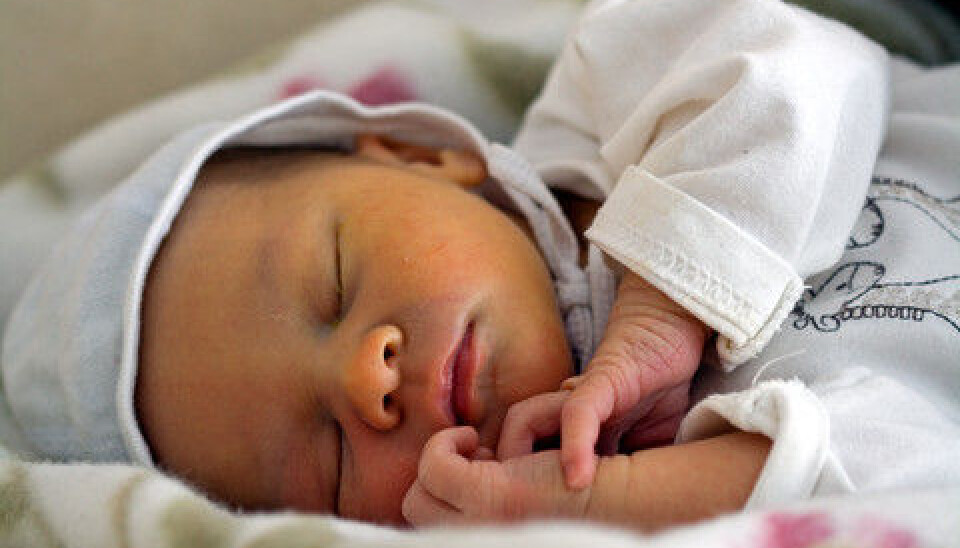
Abstinent mothers require better support
Drug-abusing mothers who become drug-free during their pregnancy have trouble understanding the needs of their babies. New research suggests they should receive greater follow-up after giving birth.
Denne artikkelen er over ti år gammel og kan inneholde utdatert informasjon.
Starting life by going through drug withdrawal is tough and grossly unfair, but unfortunately that is exactly the experience of many children of mothers who are addicts.
When a pregnant mother manages to become drug-free, the infant is spared this extra challenge, but new research shows that detox treatment isn’t enough to give the mother and the baby a satisfactory relationship and life during infancy.
Less sensitive
“From the age of three to twelve months we observed that the quality of mother-infant interaction declined,” says Torill Siqveland, a PhD research fellow at the Department of Psychology at the University of Oslo.
She participated in a Norwegian research initiative that followed nearly 90 expectant mothers who had been divided into three groups.
One group was comprised of women who were referred to institutional treatment because of drug abuse problems. These women went through detox and became completely drug-free during the course of their pregnancies.
The second group had been referred to out-patient treatment for psychiatric problems during their pregnancies. The third category was a control group of pregnant women with neither of these problems.
“We saw that both the group of mothers with psychiatric problems and the group that had become drug-free had difficulties with their role as a parent,” says Siqveland.
Didn’t understand crying
The research team visited the new mothers and their infants every three months until the babies turned one.
Among the factors they observed were the ways the mothers reacted to their child’s crying, to the infant’s body language and to mother-child eye contact.
The mothers in the group with psychiatric problems and the group with an addiction history both found it harder to understand their babies’ needs as compared to the mothers in the control group.
Some of the mothers just couldn’t figure out the meaning of their infant’s cries and their responses weren’t what the child needed then and there.
And when the babies got a little older, and stretched out their arms for contact, for example, some of the mothers pulled away and were uncomfortable with relating to the infant’s need for closeness.
“Children are social beings from day one, and they need to be comforted and acknowledged. We know this is important for the child’s development both socially and emotionally,” says Siqveland.
Maintained custody
Nearly all the mothers in the study kept custody of their children.
“Previous studies have shown that many mothers who abuse drugs during their pregnancy lose custody of their children, so detoxification programmes are essential,” stresses Siqveland.
“Because the mothers abstained from substance abuse after entering treatment and were not given methadone, none of the children were born with withdrawal symptoms or medical problems,” she adds.
Those who lost custody of their babies were mothers who failed to stay drug-free after giving birth.
Anticipated a bigger difference
“I’d actually expected to find a bigger difference in the quality of interaction between the group of mothers with psychiatric problems and the group with drug problems,” says Siqveland.
The study showed some difference between the two groups, but it wasn’t enough to be significant in a strict research context.
Siqveland adds that double diagnoses are common, meaning that psychiatric and substance abuse problems often go hand in hand, which means the mothers in the two groups might share some of the same parenting challenges.
Mothers from both test groups had experienced difficult childhoods.
“This can have an impact on their own ability to be good mothers,” Siqveland says.
The researchers now plan to continue to follow these children until they approach school age.
“Perhaps we’ll see a bigger difference between the groups as time passes,” she adds.
Support for mothers
As part of her PhD research, Siqveland also studied mothers in treatment at various institutions in Norway and says the support offered mothers with drug problems varies from one institution to another.
“Many of the institutions have a long-term follow-up scheme, but not all.”
So she believes that mothers who have stayed drug-free during their pregnancies should be better supported by health and welfare authorities after giving birth, including being given help to complete their education and to find work.
Translated by: Glenn Ostling
































